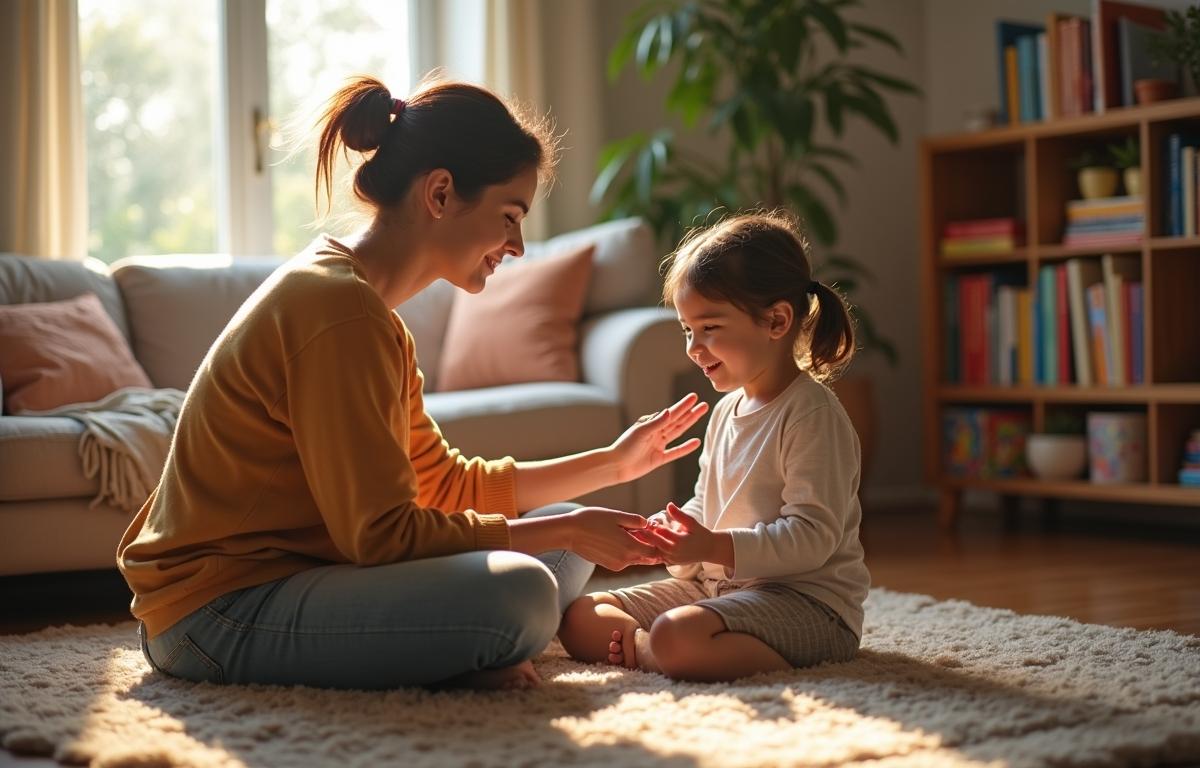Children thrive with mental health support, which fosters strong relationships and curiosity. They benefit from a stable family environment, caring guidance, and opportunities to learn about feelings and social skills. As parents, our role is to nurture that secure foundation and promote healthy development step by step. Doing so can reduce stress for kids and help them thrive emotionally and academically.
Parenting involves learning to read your child’s cues and supporting their growth while respecting their individuality. The small choices we make each day can have a big impact on child mental health. Whether it’s sitting together for a family meal or practicing gratitude, these moments can build self-esteem in children and foster lifelong mental wellness strategies.
Contents
- 1 The Role of Positive Parenting in Child Mental Health
- 2 Fostering Emotional Well-Being Through Healthy Development
- 3 Building Psychological Resilience and Social Skills for Children
- 4 Encouraging Early Intervention and Mental Health Education
- 5 Practical Strategies for Stress Management
- 6 Strategies for Home and School Collaboration
- 7 Creating Supportive Environments at Home
- 8 Emphasizing Consistency and Family Connection
The Role of Positive Parenting in Child Mental Health
A warm and respectful approach sets the stage for strong emotional well-being in kids. Encouraging open dialogue helps them develop better communication and trust. When parents spend quality time with their children, it strengthens their bond and nurtures mental resilience in youth. This connection prepares children to handle disagreements and conflicts more gracefully.
Balancing gentle guidance with clear boundaries supports behavioral health in kids. While children flourish with consistent structure, they also need enough flexibility to explore their interests. Positive parenting means praising effort instead of only praising results. Over time, this framework encourages more independence, reduces anxiety, and helps children develop emotional intelligence.
Fostering Emotional Well-Being Through Healthy Development
Children need room to grow, physically and emotionally. Providing opportunities for safe exploration encourages psychological health for children and builds confidence in tackling new challenges. Activities like painting or dancing allow them to channel energy in productive ways. With every new hobby, kids learn about their strengths and interests.
Early childhood mental health support can start at home by teaching them simple relaxation techniques. Breathing exercises or stretching can be turned into playful games. This method of stress management for kids shows them how to calm their minds when they hit bumps in the road. By giving them fun outlets for their energy, we promote emotional well-being in kids and prevent mental health issues in the long run.
Building Psychological Resilience and Social Skills for Children
Children benefit from learning how to handle setbacks without feeling defeated. Psychological resilience blooms when kids recognize mistakes as part of learning instead of proof that they aren’t good enough. By celebrating small victories and apologizing when mistakes are made, you demonstrate accountability and show them how to move forward. They slowly realize that tackling fears can foster growth and independence.
Social skills for children often develop through consistent peer interaction and guided conversations at home. Role-playing everyday scenarios can help them learn how to share, respect differences, and manage disagreements. Praising empathetic behavior also reinforces positive interactions. When social interactions are healthy, it directly contributes to supporting children’s mental health and helps them feel more secure in different situations.
Fun Ways to Boost Resilience
Try a gratitude discussion at dinner or a bedtime reflection on the highlights of the day. This allows children to focus on what went right rather than fixating on minor disappointments. Simple habits like these can work wonders when promoting mental health in children.
Encouraging Early Intervention and Mental Health Education
Watching for early signs of stress or anxiety is crucial. If you notice changes in appetite, trouble sleeping, or mood swings, consider seeking mental health resources for parents. It’s never too soon to get professional feedback and figure out possible child mental health interventions. Early intervention can prevent bigger challenges in the future and create a supportive environment where kids feel comfortable sharing concerns.
Including mental health education for children in your daily family routine can demystify overwhelming emotions. Reading age-appropriate books together helps them understand complex feelings. Children’s emotional intelligence grows when you talk openly about happiness, sadness, or frustration. They learn that these emotions are normal and manageable with the right coping skills for kids.
Practical Strategies for Stress Management
Even small worries can feel daunting to a young mind. Empowering children with anxiety management techniques can be as simple as leading them through a calming countdown. Have them identify five things they can see, four things they can touch, three things they can hear, two things they can smell, and one thing they can taste. These steps ground them in the moment and shift their attention away from troubling thoughts.
Teaching Mindfulness for Children
Mindfulness encourages kids to notice their feelings without judgment. You can practice short mindfulness exercises before bedtime or during a relaxing morning routine. This approach gives them a gentle method to regulate their inner world, making it a valuable tool for preventing mental health issues in kids. Over time, mindfulness becomes a comfortable technique they can tap into whenever stress arises.
Strategies for Home and School Collaboration
A united front between parents and teachers goes a long way. Coordinating with school mental health programs can improve outcomes and ensure a consistent message. When children see that the adults in their lives communicate well and share goals, they feel more secure and confident in their environment. This security is key to behavioral health because it provides structure and reassurance.
It’s helpful to ask teachers or counselors about your child’s behavior, strengths, and any red flags. This conversation can guide you toward positive mental health practices for kids and ensure you’re both on the same page. Family role in child mental health becomes more powerful when educators understand your child’s context. Working together, you can track progress and support the child’s day-to-day mental wellness strategies.
Getting Involved in School Activities
Volunteering during class events or attending parent-teacher meetings shows that you value your child’s classroom experience. Children often develop more self-esteem when they see their parents taking an active interest in their academic and social lives. These efforts not only strengthen your relationship but also help you spot issues early.
Creating Supportive Environments at Home
Your home can become a safe haven that promotes healthy development. Small gestures, such as greeting your child with a warm hug or note of encouragement, build a foundation of trust and love. Self-esteem in children flourishes when they feel valued and heard. Regular routines, like reading a bedtime story, give kids something to look forward to and help them wind down.
Keeping open lines of communication also prevents big surprises over time. Let them express their opinions on family decisions and encourage them to help in small household tasks. This inclusion cultivates a sense of responsibility and fosters resilience in children. Knowing that their voice matters makes them feel secure, boosting their emotional well-being and confidence.
Helping Kids Cope with Change
Children can get anxious during big life events like moving, changing schools, or welcoming a new sibling. Prepare them by giving simple details about what will happen next. Show empathy for their worries and emphasize the support you’ll provide. This approach helps children stress management by making transitions feel less scary or unpredictable.
Emphasizing Consistency and Family Connection
Aim for consistency in schedules, rules, and discipline methods. Children feel safer when they can anticipate what happens each day. That doesn’t mean there’s no room for spontaneity. Instead, it means giving them a stable framework where they know how to behave and what to expect. This predictability sets the stage for healthy development.
Family activities, like weekly movie nights or Sunday walks, reinforce shared values and unity. These routines not only teach life skills but also reinforce the bond you share. Having a close family network is a key factor in nurturing mental health in children. Whether it’s cooking together or sharing jokes, each moment contributes to a sense of warmth and belonging.
Additional Mental Health Resources for Parents
Many community organizations offer workshops or group sessions for parents looking to bolster childhood mental health. Online forums can also be a place to share experiences, tips, and strategies. If you ever feel overwhelmed, speaking with a child psychologist or counselor can help pinpoint practical solutions for raising mentally healthy kids. Such professional advice can make the journey smoother and more reassuring for everyone involved.
By offering comfort, structure, and respect for a child’s emotions, we pave the way for their long-term growth. Each supportive habit we cultivate now can lead to a lifetime of emotional stability and optimism. Effective parenting is an ever-evolving dance, but every small step forward contributes to children’s emotional and psychological well-being.



